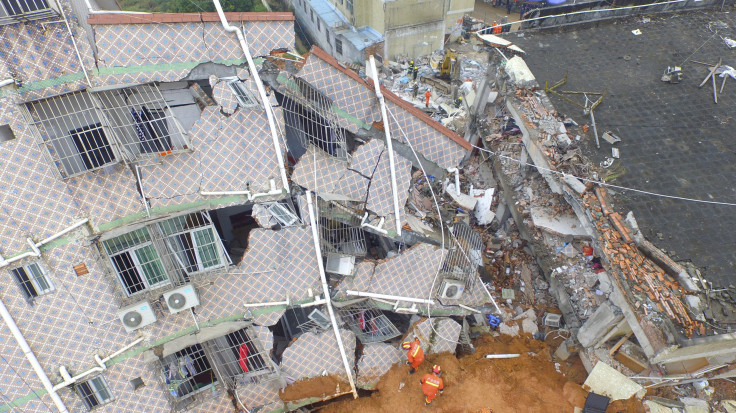China Shenzhen Landslide Caused By Safety Violations, Not Nature, Officials Say

The landslide in southern China that killed two people and left more than 70 people missing on Monday was caused by breaches of construction safety rules and was not a natural disaster, a government website quotes local authorities as saying.
An investigation by a team in Shenzhen directed by the central government in Beijing found the disaster stemmed from waste construction material in a landfill site rather than a natural geological movement, a statement posted late Friday on the Cabinet's website said.
"Those held accountable will be seriously punished in accordance with the law," the statement said.
Officials paid tribute to the dead at a ceremony in Shenzhen:
Photo: Officials, rescuers stand in silent tribute to victims of #Shenzhenlandslide pic.twitter.com/geTPxQhfPU
— CCTVNEWS (@cctvnews) December 26, 2015
The manmade disaster, which buried 33 buildings in an industrial park, has raised questions about China's industrial safety standards and lack of oversight that has led to fatal accidents, a byproduct of the country's rapid growth.
At the Shenzhen industrial park, there is still some risk of more landslides at three places, and experts have been brought in to deal with the issue, the official Xinhua news agency on Friday quoted a Shenzhen official as saying.
"There are also dangerous chemical items that need to be identified and treated," said Yang Shengjun, head of the Shenzhen Housing and Urban-Rural Development Bureau.
Yang said no air or water contamination has been detected yet, according to Xinhua.
The company managing the dump site, Shenzhen Yixianglong, was urged to stop work four days before the disaster, an official of a government-appointed monitoring agency said Thursday.
Xinhua earlier reported that the dump was being used 10 months after it was supposed to have stopped taking waste, earning Yixianglong some 7.5 million yuan ($1.16 million) in fees.
© Copyright IBTimes 2024. All rights reserved.











